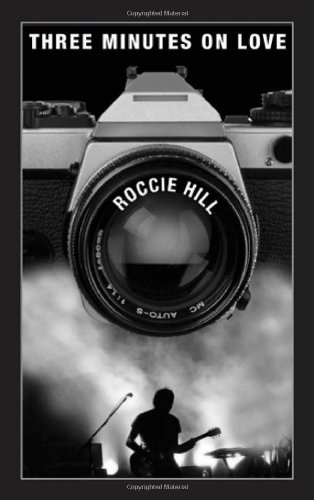Books |
Three Minutes on Love
Roccie Hill
By
Published: Apr 14, 2013
Category:
Fiction
You write a book about rock music, you’ve got a problem.
The ending.
Does the rocker burn out? Kill someone? Die?
Those are pretty much the available choices. There are, of course, rockers like Bruce Springsteen or Paul Simon — career artists not bent on self-destruction — but their lives tend to be about work and family. No drama there.
So the challenge for the rock novelist is mostly to show us high wire, the flirtation with danger — no rush to let us see the inevitable fall.
Hats off to Roccie Hill, who not only found a way around the expected ending but found a new way to tell a story about musicians and the life of music. Reading her bio, I can see why — she’s written rock lyrics, taught creative writing in Paris, conceived the Paris Writers’ Conference and organized a film festival in Avignon. Along the way, she raised a daughter who is now an Air Force pilot. This is her first novel.
If I didn’t know better, I’d say Roccie Hill was also the assistant to a photographer like Annie Leibovitz in the late ‘60s, because she has not only made her narrator female, she’s made her a nobody who becomes a somebody through the lens of her camera. Rosie Kettle grows up in the California desert, starts art school in San Francisco in 1968, and, almost as a fluke, takes a picture of a black blues musician. A week later, he hangs himself. This picture, the last ever of him, becomes legendary. And Rosie’s launched.
I liked Rosie as an unknown. As she rises, I love her. Because she’s real, an artist in the making. About printing in a darkroom:
I love that smell, those places; everything else is extinguished when I am in such a room. The mechanics of a battle was never what I wanted; I chased light my whole life, orphaned myself beside it. I pursued such a small thing, but that was it for me.
“Three Minutes on Love’ — the title refers to the length of a rock song — is a love story, set to music. “It is not a romance," Hill writes, “but a story about raw, courageous love that lasts decades.” Rosie’s lover is David Wilderspin, 19 when we meet him. He’s not “one of those kids who had tags on their toes from the start.” Still, he’s a musician, and “musicians were like children in cages and it was the game of people like me and the road people to trick them into keeping to some secret plan, to tell them only the bit they needed to know just before it was going to happen, so late they couldn’t change things.”
Rosie is cranked on speed when she goes to shoot David. She collapses. He takes care of her. And soon, they’re lovers. Real lovers, glued by blood and bone. For a decade. More, really. It’s a great story. Indeed, it’s so good — about the music business, bands, drugs and sex — that it reads like the memoir of a celebrity whose name we should know. [To buy the book from Amazon, click here.]
What goes wrong? So much. But it’s not what you expect. And I’m not going to spoil it. Let’s just say that the book moves away from David-and-Rosie and, if you’re like me, you’ll fall in love all over again with Rosie. Like this:
I began to print my own pictures at school instead of at home. Even though I had the best enlarger you could buy, and at the college I often had to wait to get on the equipment, somehow the smell of the fix and stop were better there. I would pass around the corner of the student dark room into the blackness. Like an oasis, that first sweet, sharp breath of the chemicals signaled that I was home safe.
I would work for four or five hours without speaking, slipping filters and wheeling lenses like little moons of glass over my images that lay at first invisible on stark fiber paper. Printing up was my favorite, because that was the gratification. Working at the college I began to find again what I had loved about this process, the excitement of watching a picture come slowly through the bath, watching while the images darken, never quite knowing when they would stop and whether or not I could finally coax the best out of the silver.
You don’t have to care about rock music to be excited about this novel. You just have to care about good writing. And Roccie Hill is so good she puts dozens of better known writers to shame.


